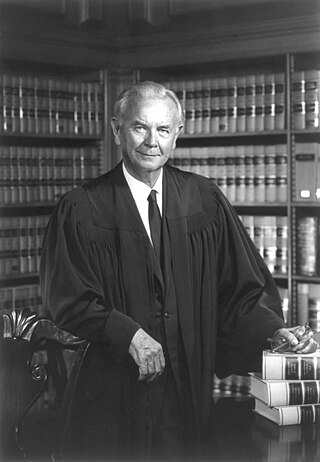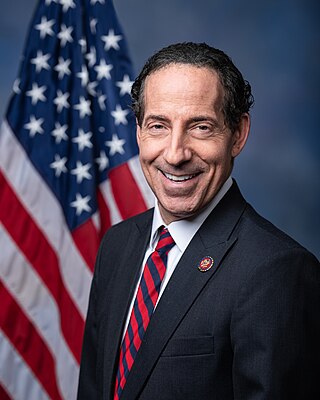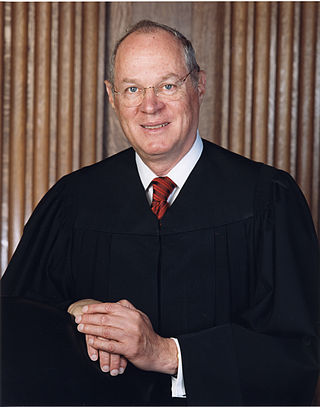Related Research Articles

Thurgood Marshall was an American civil rights lawyer and jurist who served as an associate justice of the Supreme Court of the United States from 1967 until 1991. He was the Supreme Court's first African-American justice. Prior to his judicial service, he was an attorney who fought for civil rights, leading the NAACP Legal Defense and Educational Fund. Marshall was a prominent figure in the movement to end racial segregation in American public schools. He won 29 of the 32 civil rights cases he argued before the Supreme Court, culminating in the Court's landmark 1954 decision in Brown v. Board of Education, which rejected the separate but equal doctrine and held segregation in public education to be unconstitutional. President Lyndon B. Johnson appointed Marshall to the Supreme Court in 1967. A staunch liberal, he frequently dissented as the Court became increasingly conservative.

Warren Earl Burger was an American attorney and jurist who served as the 15th chief justice of the United States from 1969 to 1986. Born in Saint Paul, Minnesota, Burger graduated from the St. Paul College of Law in 1931. He helped secure the Minnesota delegation's support for Dwight D. Eisenhower at the 1952 Republican National Convention. After Eisenhower won the 1952 presidential election, he appointed Burger to the position of Assistant Attorney General in charge of the Civil Division. In 1956, Eisenhower appointed Burger to the United States Court of Appeals for the District of Columbia Circuit. Burger served on this court until 1969 and became known as a critic of the Warren Court.

William Joseph Brennan Jr. was an American lawyer and jurist who served as an Associate Justice of the Supreme Court of the United States from 1956 to 1990. He was the seventh-longest serving justice in Supreme Court history, and was known for being a leader of the Court's liberal wing.

The Harvard Law Review is a law review published by an independent student group at Harvard Law School. According to the Journal Citation Reports, the Harvard Law Review's 2015 impact factor of 4.979 placed the journal first out of 143 journals in the category "Law". It is published monthly from November through June, with the November issue dedicated to covering the previous year's term of the Supreme Court of the United States. The journal also publishes the online-only Harvard Law Review Forum, a rolling journal of scholarly responses to the main journal's content. The law review is one of three honors societies at the law school, along with the Harvard Legal Aid Bureau and the Board of Student Advisors. Students who are selected for more than one of these three organizations may only join one.

The American University Washington College of Law is the law school of American University, a private research university in Washington, D.C. It is located on the western side of Tenley Circle in the Tenleytown section of northwest Washington, D.C. The school is accredited by the American Bar Association and a member of the AALS.

Plyler v. Doe, 457 U.S. 202 (1982), was a landmark decision in which the Supreme Court of the United States struck down both a state statute denying funding for education of undocumented immigrant children in the United States and an independent school district's attempt to charge an annual $1,000 tuition fee for each student to compensate for lost state funding. The Court found that any state restriction imposed on the rights afforded to children based on their immigration status must be examined under a rational basis standard to determine whether it furthers a substantial government interest.

Jamin Ben Raskin is an American attorney, law professor, and politician serving as the U.S. representative for Maryland's 8th congressional district since 2017. A member of the Democratic Party, he served in the Maryland State Senate from 2007 to 2016. The district previously included portions of Montgomery County, a suburban county northwest of Washington, D.C., and extended through rural Frederick County to the Pennsylvania border. Since redistricting in 2022, Raskin's district now encompasses only part of Montgomery County.
Stephen J. Friedman is the former commissioner of the United States Securities and Exchange Commission, and seventh president of Pace University from 2007 to 2017. Prior to that, Friedman has served as dean of the Pace Law School, and senior partner and co-chairman of Debevoise & Plimpton. On February 1, 2017, Friedman urged New York to increase student financial aid to both public and private universities.

The Brethren: Inside the Supreme Court is a 1979 book by Bob Woodward and Scott Armstrong. It gives a "behind-the-scenes" account of the United States Supreme Court during Warren Burger's early years as Chief Justice of the United States. The book covers the years from the 1969 term through the 1975 term. Using Woodward's trademark writing technique involving "off-the-record" sources, the book provides an account of the deliberations leading to some of the court's more controversial decisions from the 1970s. Among the cases with substantial treatment in the book was the decision in United States v. Nixon (1974), where the Supreme Court unanimously ruled that President Richard Nixon was legally obligated to turn over the Watergate tapes. In 1985, upon the death of Associate Justice Potter Stewart, Woodward disclosed that Stewart had been the primary source for The Brethren.

Paul March Smith is an American attorney who has argued many important cases, most notably Lawrence v. Texas and has argued 21 cases before the Supreme Court of the United States. In January 2017, he joined the faculty at Georgetown University Law Center, and also the Campaign Legal Center in Washington, D.C., as Vice President of Litigation and Strategy. Until 2017, he was a partner at Jenner & Block's Washington, D.C., office where he served as co-chair of the firm's Election Law and Redistricting practice.

William J. Brennan, Jr., who authored the opinion in New York Times Co. v. Sullivan, has several awards named in his honor, which are presented to individuals for dedication to public interest and free expression. Awards named after William J. Brennan, Jr. are presented by the following organizations.

The Burger Court was the period in the history of the Supreme Court of the United States from 1969 to 1986, when Warren Burger served as Chief Justice of the United States. Burger succeeded Earl Warren as Chief Justice after the latter's retirement, and Burger served as Chief Justice until his retirement, at which point William Rehnquist was nominated and confirmed as Burger's replacement. The Burger Court is generally considered to be the last liberal court to date. It has been described as a "transitional" court, due to its transition from having the liberal rulings of the Warren Court to the conservative rulings of the Rehnquist Court.

Anthony McLeod Kennedy is an American lawyer and jurist who served as an associate justice of the Supreme Court of the United States from 1988 until his retirement in 2018. He was nominated to the court in 1987 by President Ronald Reagan, and sworn in on February 18, 1988. After the retirement of Sandra Day O'Connor in 2006, he was considered the swing vote on many of the Roberts Court's 5–4 decisions.

Donald Beaton Verrilli Jr. is an American lawyer who served as the solicitor general of the United States from 2011 to 2016. President Barack Obama nominated Verrilli to the post on January 26, 2011. On June 6, the United States Senate confirmed Verrilli in a 72–16 vote, and he was sworn in on June 9. Verrilli previously served in the Obama administration as the associate deputy attorney general and as Deputy Counsel to the President. He is currently a partner in the Washington, D.C. office of Munger, Tolles & Olson and a lecturer at Columbia University Law School, his alma mater.

The nomination and confirmation of justices to the Supreme Court of the United States involves several steps, the framework for which is set forth in the United States Constitution. Specifically, Article II, Section 2, Clause 2, provides that the president of the United States nominates a justice and that the United States Senate provides advice and consent before the person is formally appointed to the Court. It also empowers a president to temporarily, under certain circumstances, fill a Supreme Court vacancy by means of a recess appointment. The Constitution does not set any qualifications for service as a justice, thus the president may nominate any individual to serve on the Court.

Clarence Thomas is an American lawyer and jurist who serves as an associate justice of the Supreme Court of the United States. He was nominated by President George H. W. Bush to succeed Thurgood Marshall and has served since 1991. After Marshall, Thomas is the second African American to serve on the Court and is its longest-serving member since Anthony Kennedy's retirement in 2018. Since Stephen Breyer's retirement in 2022, he is also the Court's oldest member.
The Marshall-Brennan Constitutional Literacy Project is civic education program in which law students work with local high schools to enhance understanding of constitutional law and oral advocacy. The project was founded in 1999 at American University's Washington College of Law in Washington, D.C., by Professor Jamie Raskin. There are now nearly 20 chapters in the United States, and there are 2 international chapters. The program began as a way of addressing civic disengagement and a lack of political participation. Through analyzing Supreme Court decisions and participating in moot court arguments, participating high school students learn about their rights as citizens, the strategic benefits of voting, how lawmaking occurs, and other fundamental constitutional processes. They also have the opportunity to compete in a national moot court competition.
Georgianna Alexandra Franklin Brennan is a former journalist. Brennan is the daughter-in-law of the late U.S. Supreme Court Justice William Joseph Brennan, Jr. and the wife of the late New Jersey assistant general William Joseph Brennan III. She worked as a features writer for the Newark Star Ledger in Newark, New Jersey and served as the newspaper's society editor.
Fisher v. University of Texas, 579 U.S. 365 (2016) is a United States Supreme Court case which held that the Court of Appeals for the Fifth Circuit correctly found that the University of Texas at Austin's undergraduate admissions policy survived strict scrutiny, in accordance with Fisher v. University of Texas (2013), which ruled that strict scrutiny should be applied to determine the constitutionality of the University's race-conscious admissions policy.
References
- 1 2 3 4 5 6 7 8 Liptak, Adam (October 4, 2010). "Brennan Book, Many Years in Making". New York Times. Retrieved 28 April 2021.
- ↑ Willis, Adam (March 24, 2021). "North Dakota's bill to allow Ten Commandments in schools likely unconstitutional, could draw lawsuits, experts say". Grand Forks Herald. Retrieved 27 April 2021.
- 1 2 3 4 5 6 7 8 9 10 11 12 13 14 "Alumni Profile: Stephen Wermiel '68". Brooklyn Friends School. Retrieved 28 April 2021.
- ↑ Craft, Philip (January 25, 2011). "Stephen Wermiel, official biographer of Justice Brennan, speaks at Elon Law". Today at Elon. Retrieved 28 April 2021.
- 1 2 "Supreme Court Experts Available to Comment on Sotomayor Nomination". Newswise. May 26, 2009. Retrieved 28 April 2021.
- ↑ O'Donnell, Michael (November 17, 2010). "Without Artifice: On William Brennan". The Nation. Retrieved 28 April 2021.
- ↑ Stern, Seth (January 1, 2011). "William Brennan '31 and his complicated relationship with Harvard Law School". Harvard Law Today. Retrieved 28 April 2021.
- 1 2 3 4 5 6 7 8 Lithwick, Dahlia (October 8, 2010). "Getting to Five". New York Times. Retrieved 27 April 2021.
- ↑ Mears, Bill (September 29, 2010). "Author stresses Justice Brennan's continued relevance". CNN. Retrieved 28 April 2021.
- 1 2 3 Toobin, Jeffrey (December 28, 2003). "A Not So Brief Recess". The New Yorker. Retrieved 28 April 2021.
- ↑ Lat, David (January 26, 2007). "And You Thought You Had a Procrastination Problem". Above the Law. Retrieved 28 April 2021.
- ↑ Kragie, Andrew (April 7, 2021). "Biden Gets 2nd Opening On 9th Circ. Thanks To Judge Berzon". Lexis360. Retrieved 28 April 2021.
- ↑ "Stephen Wermiel". SCOTUSBlog. Retrieved 27 April 2021.
- ↑ "Major decisions ahead for Supreme Court". MSNBC. January 3, 2014. Retrieved 28 April 2021.
- ↑ "Aaron Keller Brian Ross Andrew Bringuel & Stephen Wermiel Talk Kavanaugh Hearing". YouTube. Retrieved 28 April 2021.
- ↑ "Stephen J. Wermiel". C-SPAN. Retrieved 28 April 2021.
- 1 2 Strauss, Daniel (September 17, 2008). "Program Brings Constitutional Basics to High School Students". Roll Call. Retrieved 28 April 2021.
- ↑ Winter, Erica. "From Law School To High School—Washington College Of Law's Marshall-Brennan Program Teaches The Constitution One Classroom At A Time". Law Crossing. Retrieved 28 April 2021.
- ↑ Swoyer, Alex (February 8, 2021). "'No one better': Dems bank on 'relentless' Raskin to sway Republicans on impeachment". Washington Times. Retrieved 28 April 2021.
- ↑ "Pre-Gaming the Upcoming Supreme Court Term". Wall Street Journal. September 27, 2006. Retrieved 28 April 2021.
- 1 2 ""Inside the Supreme Court: What's Next? Who's Next?" with Steve Wermiel". Hotchkiss Library of Sharon. Retrieved 28 April 2021.